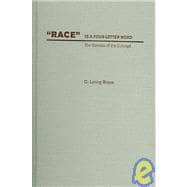| Preface |
|
viii | |
| Introduction |
|
1 | (3) |
|
The Biology of Human Variation |
|
|
4 | (13) |
|
|
|
4 | (1) |
|
|
|
5 | (12) |
|
The Perception of Human Differences in the Past |
|
|
17 | (20) |
|
What Shall We Call ``Them''? |
|
|
17 | (1) |
|
|
|
18 | (1) |
|
|
|
19 | (2) |
|
|
|
21 | (1) |
|
Enlightenment: The ``Age of Reason'' |
|
|
22 | (1) |
|
Science and the Greatness of God |
|
|
23 | (1) |
|
|
|
23 | (1) |
|
Linnaeus and Classification |
|
|
24 | (6) |
|
|
|
30 | (2) |
|
Camper and the Facial Angle |
|
|
32 | (3) |
|
Assessing the Meaning of Human Differences |
|
|
35 | (2) |
|
|
|
37 | (7) |
|
The Roots of ``Polygenism'' |
|
|
37 | (5) |
|
|
|
42 | (2) |
|
Anthropology in the Enlightenment |
|
|
44 | (13) |
|
Blumenbach and ``Degeneration'' |
|
|
44 | (3) |
|
The Scottish Enlightenment Comes to America |
|
|
47 | (3) |
|
Samuel Stanhope Smith: ``Race'' from the Perspective of the American Enlightenment |
|
|
50 | (7) |
|
The Triumph of Feeling Over Reason |
|
|
57 | (9) |
|
|
|
57 | (9) |
|
|
|
66 | (10) |
|
The Founding of the American School of Anthropology |
|
|
76 | (17) |
|
The Postcolonial United States of America |
|
|
76 | (1) |
|
Samuel George Morton and the American Origin of Biological Anthropology |
|
|
77 | (16) |
|
|
|
93 | (13) |
|
Louis Agassiz, Archetypical American |
|
|
93 | (13) |
|
The Demise of Monogenism and the Rise of Polygenism |
|
|
106 | (19) |
|
John Bachman: The Last Monogenist |
|
|
106 | (4) |
|
Josiah Clark Nott: The Voice of American Racialism |
|
|
110 | (7) |
|
Scotland: Dr. Robert Knox |
|
|
117 | (2) |
|
France: Comte de Gobineau |
|
|
119 | (6) |
|
Toward a War Over Slavery and Afterward |
|
|
125 | (19) |
|
|
|
125 | (5) |
|
|
|
130 | (5) |
|
|
|
135 | (9) |
|
|
|
144 | (15) |
|
Paul Broca and the Professionalization of Biological Anthropology |
|
|
144 | (15) |
|
The Legacy of the American School in America |
|
|
159 | (19) |
|
Nathaniel Southgate Shaler (1841--1906) |
|
|
159 | (5) |
|
|
|
164 | (2) |
|
The French Connection and the Concept of ``Race'' |
|
|
166 | (3) |
|
William Z. Ripley and the Magic Three |
|
|
169 | (3) |
|
|
|
172 | (4) |
|
|
|
176 | (2) |
|
|
|
178 | (19) |
|
|
|
178 | (5) |
|
Eugenics Exported to America |
|
|
183 | (2) |
|
|
|
185 | (4) |
|
``Race'' and Eugenics Applied to the Shaping of America |
|
|
189 | (8) |
|
Henry Ford and the Ethos of the Holocaust |
|
|
197 | (7) |
|
The Anti-Semitism of Henry Ford |
|
|
197 | (1) |
|
The Protocols of the Elders of Zion |
|
|
198 | (6) |
|
The Outlook of the ``Bigot Brigade'' |
|
|
204 | (7) |
|
``Race'' and ``Intelligence'' |
|
|
204 | (1) |
|
Statistical Theology and the Worship of g |
|
|
205 | (3) |
|
Sir Cyril Burt: ``Scientific'' Fraud |
|
|
208 | (3) |
|
The Galtonian Legacy in America |
|
|
211 | (11) |
|
|
|
211 | (2) |
|
``Intelligence'' and Immigration |
|
|
213 | (4) |
|
Lewis Terman and Genetic Predestination |
|
|
217 | (2) |
|
Walter Lippmann Versus the Termanites |
|
|
219 | (3) |
|
``Race'' in Biological Anthropology |
|
|
222 | (18) |
|
Ales Hrdlicka and the Smithsonian: Organizing the Profession |
|
|
222 | (4) |
|
Academia and the Patterns of Thought in Biological Anthropology: Sir Arthur Keith |
|
|
226 | (7) |
|
Keith's Influence on America: Earnest Albert Hooton |
|
|
233 | (2) |
|
Carleton Coon on ``Race'' |
|
|
235 | (3) |
|
Science and Society on ``Race'' After World War II |
|
|
238 | (2) |
|
The Legacy of the Pioneer Fund |
|
|
240 | (28) |
|
The Promotion of ``Scientific'' Racism |
|
|
240 | (3) |
|
|
|
243 | (9) |
|
|
|
252 | (3) |
|
J. Philippe Rushton: Apostle of Apartheid |
|
|
255 | (8) |
|
|
|
263 | (5) |
|
|
|
268 | (7) |
|
|
|
268 | (7) |
| Sources Cited |
|
275 | (42) |
| Index |
|
317 | |

